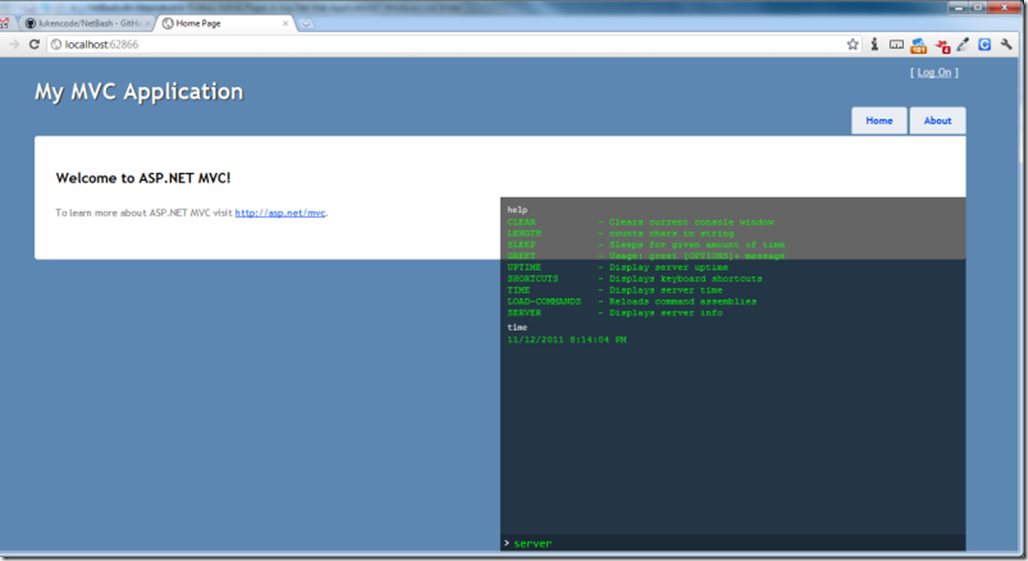NetBash – An Alternative to Endless Admin Pages in Asp.Net Web Applications
11 Dec 2011One thing that always annoys me when working on a web app is having to write those inevitable pages full of admin functions some of which are just a single button. When hacking up one such page I had a thought - a plug in library providing a command line for your web app might save me a lot of time. NetBash is what I came up with.
As you can see from the screenshot NetBash is basically a miniature command line complete with that sweet lime green on black theme that lives in your web app. It can be expanded, minimised and hidden with keyboard shortcuts (keymaster ftw) and remembers recent command history using localStorage. NetBash works in a similar way to the MVC Mini Profiler meaning that it can be installed with minimal effort on your part (just a NuGet package) and follows you around your site. This is the setup:
protected void Application_Start()
{
AreaRegistration.RegisterAllAreas();
RegisterGlobalFilters(GlobalFilters.Filters);
RegisterRoutes(RouteTable.Routes);
NetBash.Init();
//this is optional, allows you to decide who sees netbash
NetBash.Settings.Authorize = (request) =>
{
return request.IsLocal;
};
}
The call to Init inserts a couple of routes for the handler, css and js files. You also need to somewhere in your _Layout.cshtml / MasterPage add the RenderIncludes function to write the css and script tags to the page.
NetBash.RenderIncludes()
The way it works is by searching your application using reflection for classes implementing IWebCommand with a WebCommand attribute. The WebCommand attribute defines a name for the command which is used to invoke it as well as a description displayed on help. The IWebCommand interface has a method called Process which passes in a string array of arguments in the same manor that a .NET console application’s main method would. When a command is entered on the front end an ajax request is made to the NetBash handler. The handler grabs the first word of the request text and matches it to a WebCommand with the same name then invokes Process and returns the result. Here is a very simple example command that returns the length of the arguments passed in:
[WebCommand("length", "Returns number of characters in given arguments")]
public class LengthCommand : IWebCommand
{
public bool ReturnHtml
{
get { return false; }
}
public string Process(string[] args)
{
return string.Join(" ", args).Length.ToString();
}
}
Hopefully defining commands this way makes it both dead easy to implement while allowing flexibility to do something more complex (perhaps parsing the arguments with nDesk.Options).
It is pretty early days for the code so I probably wouldn’t recommend using it in a production situation at the moment. NetBash is available as a NuGet package and the source on GitHub at lukencode/netbash. I’d love to hear people opinions on the api (nothing is set in stone) as well as the UI which could use some work. I have some ideas for some useful commands (some mad stats with a .net version of spark) also Ben Cull promises me he will write an asp.net membership command pack.
